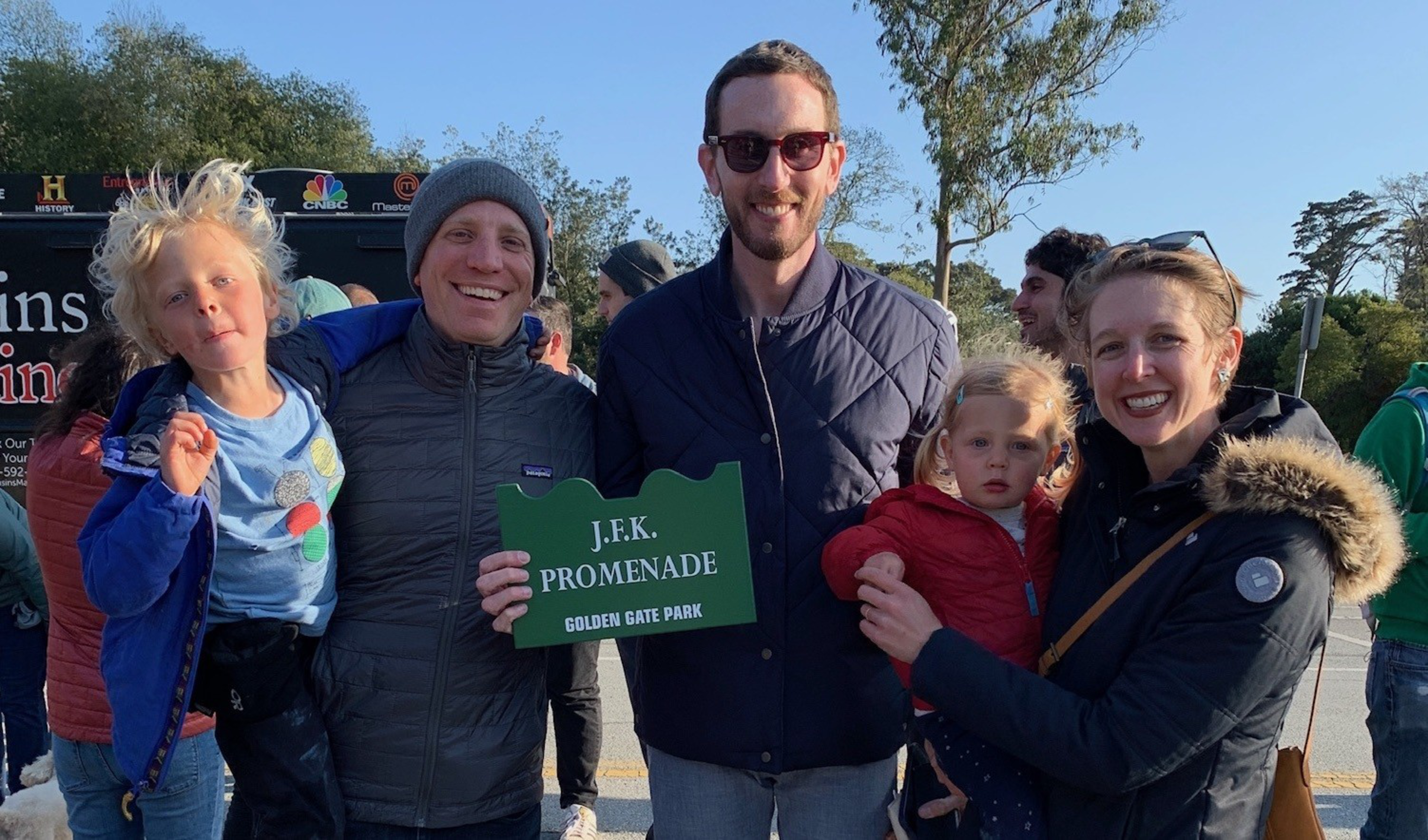Kingmakers come and go, but the speed with which San Francisco’s political hierarchy has shifted since November’s election is stunning — even by this city’s cutthroat standards.
Moderate Democratic organizations Neighbors for a Better San Francisco, TogetherSF, GrowSF, and Abundant SF all rose to prominence in the last five years by cultivating wealthy and influential donor networks that have shaped public policy and altered the outcome of elections. The groups combined to spend more than $14 million last year and scored important victories: wresting control of the local Democratic party from progressives, gaining a slim majority of the Board of Supervisors, and keeping the mayor’s office in moderate hands.
But since Daniel Lurie won the mayor’s race, a stark change has occurred in the “Big Four” power rankings. His victory not only upended a San Francisco tradition of elected officials methodically making their way up the ladder to the mayor’s office; it also profoundly disrupted the plans of orbiting political organizations.

GrowSF has unexpectedly risen to the top of the pecking order as it cozies up to Lurie. Abundant and Neighbors are licking their wounds after ruining their relationships with the new mayor. And now just a few months after the dust settled on election night, TogetherSF is dust in the wind.
Ahead of next year’s elections, the struggle to maintain or regain power and influence is already playing out in weird and unexpected ways. Welcome to the new season of “Game of Thrones: San Francisco Edition™.”
GrowSF plays it safe on way to power
In less than five years, GrowSF directors Sachin Agarwal and Steven Buss Bacio — former tech workers who pivoted to launch an organization focused on public safety and the local economy — have built the city’s largest and most influential moderate voter guide.
The savviest move the group made this past election cycle was perhaps its blandest. Instead of backing one candidate for mayor, Grow gave an open endorsement to the three moderates: Lurie, Mark Farrell, and incumbent London Breed.
Turns out risk aversion has its rewards.
Last week, Grow officials announced the equivalent of a Series D round of funding: In its fourth election cycle, the group aims to “significantly exceed” the roughly $5 million it raised for 2024, Agarwal told The Standard. Adding oomph to those efforts, Grow has brought on as a senior adviser Tyler Law, who served as Lurie’s consultant during the mayor’s race and continues in a consigliere role.


There is little doubt that Grow, which to this point has focused on elections over public policy work, will have an open-door policy with the Lurie administration.
“Every time we met with Mayor Lurie before the election, he always started a conversation by asking a question. He didn’t start it by talking at you,” Bacio said. “He would just ask something like: ‘What can I do for you? How can I help? What’s on your mind?’ And I think that is probably a core part of his personality, so I expect that to remain true during his tenure as mayor.”
The risk now for Grow is that its top-dog status makes it a target for rivals that will be jostling for the support of deep-pocketed donors.
Abundant SF burns bridges, sees inroads
Political observers have suspected that Abundant SF — a pro-urbanist organization that spent $1.8 million on supervisor and local Democratic Party races last year — is on the outs with Lurie because it supported Breed’s campaign. The truth is much messier.
Todd David, the group’s political director, burned a bridge in October when he called out Lurie over his stance on Israel, sources told The Standard. In a WhatsApp group thread for Jewish leaders in Noe Valley, David blasted Lurie for not coming out more strongly in defense of Israel a year after the Oct. 7 attack by Hamas, as well as for accepting the endorsement of Nadia Rahman, a former president of the San Francisco Women’s Political Committee and vocal critic of the Israel government.
“It was abusive and intentionally cruel: Todd stoked division within a faith community while simultaneously attacking and smearing one of the only Muslim women in local politics,” Rahman told The Standard.
Lurie was furious with David and expressed his indignation in an emergency Zoom meeting, according to sources.
'We’ve always been about bringing together the 75% of San Franciscans that just want the basics to work in the city. People want good schools, more housing, public safety, parks — these are the things that government should deliver, and we're just going to stay focused on those popular things.'
Sachin Agarwal, founder of GrowSF
“I do not wish Daniel Lurie anything but success,” David told The Standard. “I thought it was a reasonable thing to raise, and if he wants to hold onto that, there’s not much I can do.”
Combined with an op-ed David wrote for the Examiner accusing Lurie of inflating his record on housing, (opens in new tab) the Israel criticism cemented the wedge between Abundant’s political director and the Lurie administration. But David seems to think time can heal all wounds.
“There is no political doghouse in San Francisco that I have not spent some time in,” he said.
Insiders who spoke on the condition of anonymity did credit David with organizing the moderate slate that took control of the local Democratic Party last spring. However, Abundant is also doing damage control on another front.
The group helped spearhead Proposition K, a controversial fall ballot measure that will soon turn the Great Highway into a park along Ocean Beach. Furious residents in the Sunset are attempting to recall Supervisor Joel Engardio over his sponsorship of Prop. K. A successful recall would eliminate the moderates’ slim majority on the board, and some have laid blame for this on Abundant. Questions have also been raised as to whether Prop. K led to moderate supervisor losses in Districts 1 and 11.
Zack Rosen, a founder of Abundant, rejected that criticism and noted that people in the group’s network are working with Lurie’s administration on rezoning the west side for new housing and addressing the city’s apocalyptic public transportation budget. David and Rosen will be heavily involved in supporting moderate candidates in five supervisor races next year. Lurie may not love Abundant, but he needs allies to accomplish his policy goals.

“What is on the mayor’s plate? The transit issue is a disaster in the making. Who’s working on that? Us. Who’s working on the rezoning issues? Us,” Rosen said. “It’s really a matter of the more, the merrier.”
TogetherSF is dead as a doornail
Together’s epic collapse is an allegory about flying too close to the sun and seeing all of one’s hopes and dreams — and money — go up in flames.
The organization, which prioritized the drug crisis and charter reform to empower the mayor, had the backing of venture capitalist Michael Moritz, the chairman of The Standard. But the group’s decision to go all in on Farrell’s mayoral campaign proved to be a severe miscalculation.
Farrell’s insouciance toward ethics laws led to a record fine a day before the election. A committee he formed to support Proposition D, a ballot measure on charter reform, submarined that effort as voters too closely associated him with the proposal. Together flushed $7 million down the drain on the ballot measure.
Last month, Together and Neighbors for a Better San Francisco announced a merger. The deal was painted as a happy marriage, which makes sense considering that the groups’ leaders, Kanishka Cheng and Jay Cheng, respectively, are married. In reality, it was more like a red wedding.

Moritz was said to be none too happy with the election results, which is why he was fine closing up shop and offering generous severance packages to Together staff and Kanishka Cheng, who declined requests for comment. As part of the deal, Neighbors inherited TogetherSF’s coveted member list — one of the most extensive in the city.
Neighbors stranded on an island of one?
The outlook for Neighbors, which fueled two successful recalls in 2022 and has funded a host of ballot measures and moderate candidates, isn’t quite as grim. However, Lurie apparently has zero interest in working with the organization’s executive director, Jay Cheng, who was found to be working behind the scenes to help Farrell’s campaign.
In the last three years, Neighbors has spent more than $11.9 million. Much of the funding and direction comes from conservative billionaire businessman William Oberndorf, according to people familiar with the organization.
But it’s not clear how operations will move forward if Lurie is stiff-arming the organization. Would Oberndorf agree to go it mostly alone and fund all operations?
“If it’s just the Bill Oberndorf show, it should be called Neighbor — not Neighbors,” one observer quipped.

In a text message, Jay Cheng dismissed the “insider chatter” and said Neighbors has seen strong fundraising support to start the year.
“We are excited to support Mayor Lurie’s priorities and agenda,” he said. “We share the same vision and policy priorities Mayor Lurie has to move San Francisco forward. There is a lot of work to do to deliver the change that voters are hungry for, and we all need to pitch in to help get it done.”
Next season on ‘Game of Thrones: San Francisco Edition™’
The rise and fall of power brokers in San Francisco is always fluid, and no one expects today’s chess board to be untouched come next year. The city has a deficit that is creeping toward a billion dollars, and Lurie’s honeymoon in office will officially be over by the time his first budget is due in June.
Fractured relationships with labor are sure to ensue, as will fights over Engardio’s potential recall. Lurie’s promise of building temporary shelters across the city in record time is giving pie-in-the-sky vibes, and the housing and drug crises won’t be solved overnight. Pushing forward new revenue ideas to save the San Francisco Municipal Transportation Agency will likely require moderates of all stripes to rally weary voters.
Lurie may have allies he prefers right now, but he’ll need a bigger tent by the time voters go back to the polls in 2026.
“It’s an ecosystem,” Rosen said. “Successful coalitions that drive policy outcomes — not win races, but get actual policy outcomes — that requires multiple groups that can say, ‘If not for me, this wouldn’t have happened.’ In order to get policy outcomes, you need coalitional power.”

